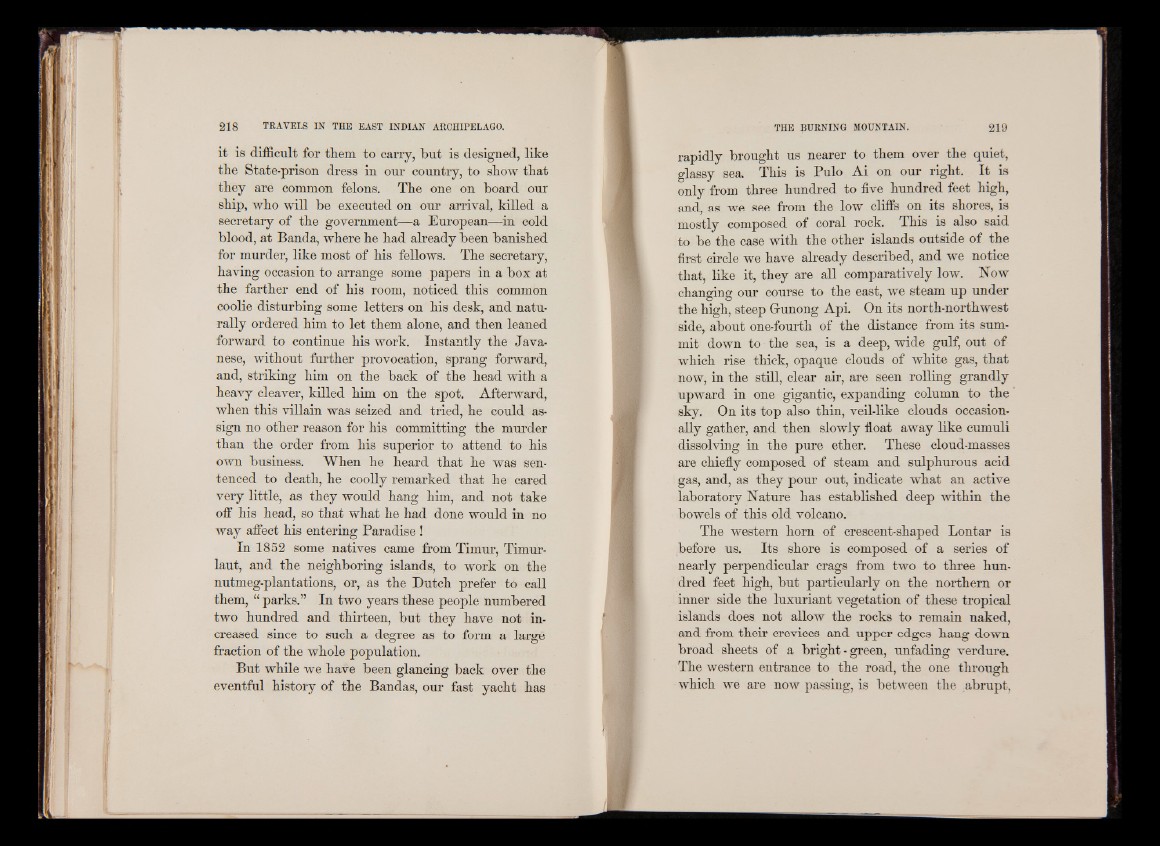
it is difficult for them to carry, but is designed, like
the State-prison dress in our country, to show that
they are common felons. The one on board our
ship, who will be executed on our arrival, killed a
secretary of the government—a European—in cold
blood, at Banda, where he had already been banished
for murder, like most of his fellows. The secretary,
having occasion to arrange some papers in a box at
the farther end of his room, noticed this common
coolie disturbing some letters on his desk, and naturally
ordered him to let them alone, and then leaned
forward to continue his work. Instantly the Javanese,
without further provocation, sprang forward,
and, striking him on the back of the head with a
heavy cleaver, killed him on the spot. Afterward,
when this villain was seized and tried, he could assign
no other reason for his committing the murder
than the order from his superior to attend to his
own business. When he heard that he was sentenced
to death, he coolly remarked that he cared
very little, as they would hang him, and not take
off his head, so that what he had done would in no
way affect his entering Paradise !
In 1852 some natives came from Timur, Tim nr.
laut, and the neighboring islands, to work on the
nutmeg-plantations, or, as the Dutch prefer to call
them, “ parks.” In two years these people numbered
two hundred and thirteen, but they have not increased
since to such a degree as to form a large
fraction of the whole population.
But while we have been glancing back over the
eventful history of the Bandas, our fast yacht has
rapidly brought us nearer to them over the quiet,
glassy sea. This is Pulo Ai on our right. It is
only from three hundred to five hundred feet high,
and, as we see from the low cliffs on its shores, is
mostly composed of coral rock. This is also said
to be the case with the other islands outside of the
first circle we have already described, and we notice
that, like it, they are all comparatively low. Now
changing our course to the east, we steam up under
the high, steep Gunong Api. On its north-northwest
side, about one-fourth of the distance from its summit
down to the sea, is a deep, wide gulf, out of
which rise thick, opaque clouds of white gas, that
now, in the still, clear air, are seen rolling grandly
upward in one gigantic, expanding column to the
sky. On its top also thin, veil-like clouds occasionally
gather, and then slowly float away like cumuli
dissolving in the pure ether. These cloud-masses
are chiefly composed of steam and sulphurous acid
gas, and, as they pour out, indicate what an active
laboratory Nature has established deep within the
bowels of this old volcano.
The western horn of crescent-shaped Lontar is
before us. Its shore is composed of a series of
nearly perpendicular crags from two to three hundred
feet high, but particularly on the northern or
inner side the luxuriant vegetation of these tropical
islands does not allow the rocks to remain naked,
and from their crevices and upper edges hang down
broad sheets of a bright - green, unfading verdure.
The western entrance to the road,7 the one througOh
which we are now passing, is between the abrupt,